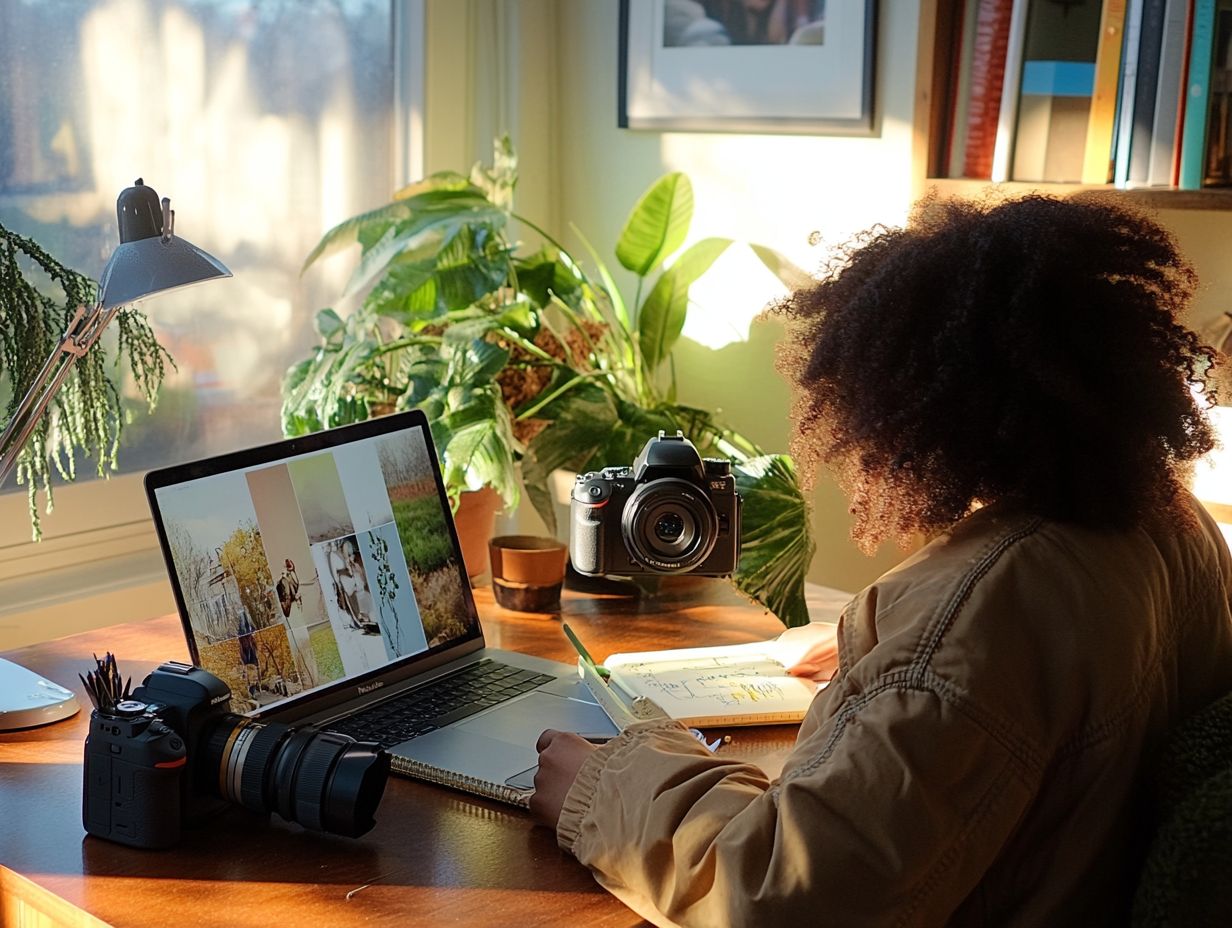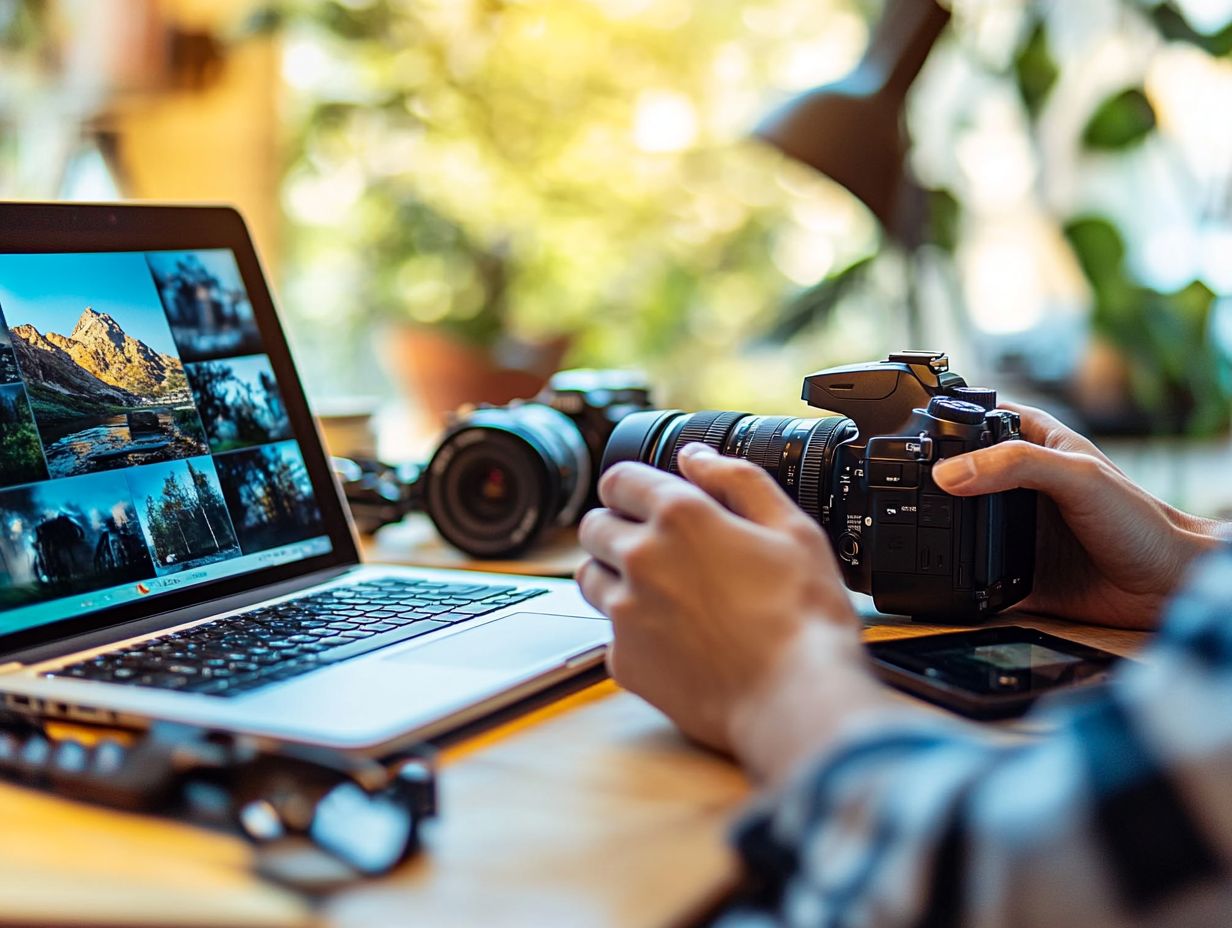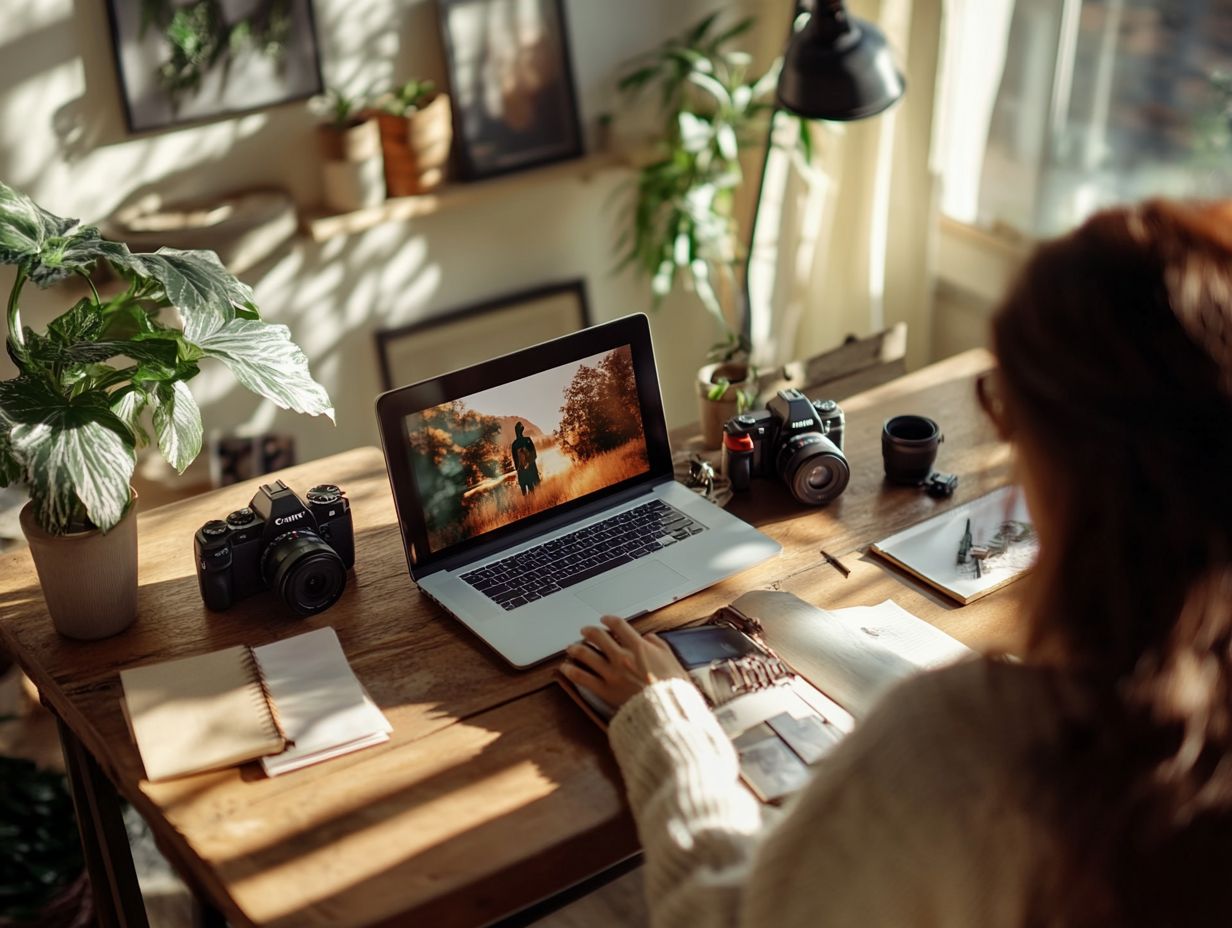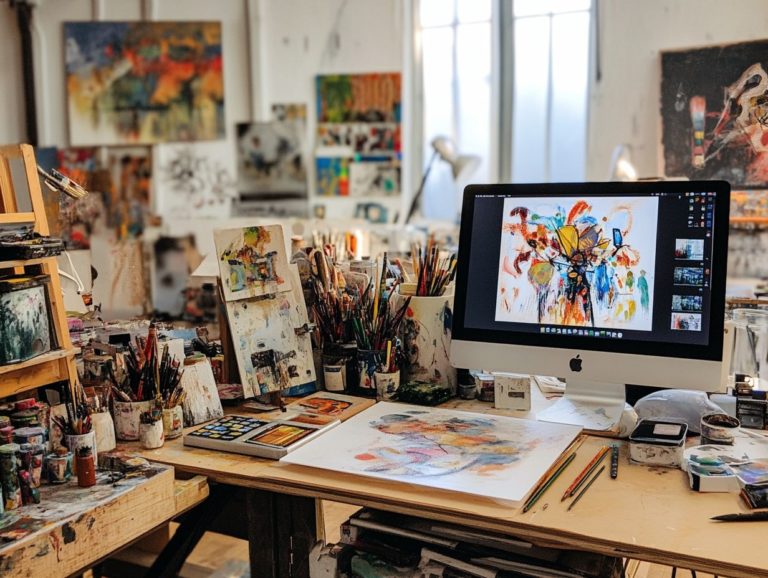Photography Basics: Online Courses to Get You Started
Photography, an exquisite art form that encapsulates moments and emotions, can feel both exhilarating and daunting for newcomers.
This guide distills the essentials, helping you navigate from understanding your camera to mastering diverse styles like landscape, portrait, and wildlife photography.
Get ready to dive into key concepts such as composition, lighting, and post-processing, accompanied by practical tips designed to elevate your skills.
Whether you re eager to capture breathtaking images or contemplating online courses, this resource provides everything you need to embark on your photographic journey with confidence.
Contents
- Key Takeaways:
- 2. Understanding Your Camera
- 3. Composition and Framing
- 4. Lighting Techniques
- 5. Transform Your Images with Editing and Post-Processing!
- 6. Landscape Photography
- 7. Portrait Photography
- 8. Street Photography
- 9. Wildlife Photography
- 10. Product Photography
- 11. Event Photography
- 12. Night Photography
- 13. Mobile Photography
- 14. Tips and Tricks for Beginners
- 15. Choosing the Right Online Course for You
- Frequently Asked Questions
- What are some benefits of taking online photography courses?
- What topics are covered in online photography courses?
- Do I need a professional camera to take online photography courses?
- How long does it take to complete an online photography course?
- Are there any requirements for taking online photography courses?
- Can I interact with the instructor and other students in an online photography course?
Key Takeaways:
Start with the basics: A strong understanding of photography fundamentals is crucial for any aspiring photographer. Online courses can help you learn about the technical aspects of your camera, composition, and lighting techniques.
Explore different genres: Discover your interests with a variety of photography topics, from landscapes to portraits to product photography.
Expand your skills: Learn to edit and post-process your photos. Online courses also provide tips to enhance your photography.
2. Understanding Your Camera
Understanding your camera is essential for mastering photography, as it gives you the power to change settings like shutter speed, aperture, and exposure to achieve the image quality you desire.
When you delve into the various camera types, you’ll find that DSLR cameras stand out as a favorite among both novice and seasoned photographers. These versatile devices offer a wealth of functionalities, allowing you to capture everything from breathtaking landscapes to intimate portraits.
Key settings, such as ISO, are critical in determining your camera’s sensitivity to light, while aperture influences the depth of field and brightness of your images.
If you’re a beginner eager to transition into manual mode, start by experimenting with exposure settings. Practicing how changes in shutter speed and aperture affect your shots will enhance your skills.
Engaging in simple exercises, like photographing the same scene with different settings, can help demystify the process and build your confidence in capturing that perfect image.
3. Composition and Framing
Mastering composition and framing is essential for creating compelling photographs; these elements guide the viewer’s gaze and enhance the overall impact of your images.
By understanding and applying various techniques, such as the rule of thirds where you position subjects along intersecting lines you can significantly elevate your work. Leading lines serve as another powerful tool, directing attention and creating depth, drawing the viewer further into the scene.
Embracing symmetry can instill a sense of balance and harmony, making your images visually captivating. As a beginner, you should seize every opportunity to experiment with these techniques in diverse environments.
Notice how slight adjustments in framing can transform a shot. Regular practice will cultivate an intuitive grasp of these principles, ultimately leading to striking compositions that truly resonate with your audience.
4. Lighting Techniques
Lighting techniques are essential in photography, profoundly impacting the mood, clarity, and overall quality of your images, whether you re utilizing natural light or artificial sources.
To truly elevate your photographic skills, it s important to understand how to harness the subtleties of various lighting methods. For instance, natural light, particularly during the golden hour, offers a soft and flattering glow that can transform your portraits into beautiful pictures or your landscapes into breathtaking vistas.
On the other hand, an on-camera flash can be your best friend in low-light situations, helping to fill in shadows and add depth.
By mastering the art of positioning and bouncing light, you can achieve perfectly balanced exposures and draw attention to specific subjects, turning ordinary scenes into captivating visual narratives. Don t shy away from experimenting with light modifiers like reflectors and diffusers; they provide you with the versatility to creatively manipulate shadows and highlights, further enhancing your photographic storytelling.
Ready to take the plunge? Start your photography journey today!
5. Transform Your Images with Editing and Post-Processing!
Editing and post-processing are crucial elements of your photography workflow. They allow you to elevate your images and bring your creative vision to life using software like Adobe Photoshop.
With a rich array of tools and techniques at your fingertips like color correction, layer adjustments, and retouching you can transform ordinary shots into visually stunning masterpieces.
For beginners, exploring user-friendly resources is vital. Many online platforms offer a wealth of tutorials, covering everything from basic cropping and brightness tweaks to more complex skills like masking, which hides parts of an image, and blending modes, which change how layers interact.
Practicing with these tools and following step-by-step guides will not only boost your confidence but also deepen your understanding of the craft. Experiment with various styles to discover what truly resonates with your artistic sensibilities.
6. Landscape Photography

Landscape photography invites you to capture the stunning beauty of nature. It offers a unique opportunity to refine your skills while exploring diverse outdoor settings and compositions.
To excel in this genre, mastering composition is essential. Thoughtfully framing your scene can elevate an ordinary photograph into a captivating work of art.
Timing is equally important; the beautiful times of sunrise and sunset bathe the world in soft, diffused light, bringing colors and textures to life.
By paying close attention to natural light, you can evoke mood and atmosphere in your images, making them resonate deeply. Engaging in specific projects can sharpen your craft.
Capture the stunning seasonal changes in a single location or focus on the dynamic interplay of light and shadow across various landscapes. These exercises can significantly boost your skills and ignite your creativity!
7. Portrait Photography
Portrait photography focuses on capturing the essence and emotions of individuals through thoughtfully crafted settings, lighting, and composition. This style is both popular and immensely rewarding.
In this artistic journey, you’ll often experiment with various poses to showcase your subject’s unique character, guiding them to express genuine emotions that weave a captivating narrative.
Proper lighting techniques, whether from the soft glow of natural light or the gentle illumination of softboxes, can deeply affect the mood of the portrait, adding layers of depth and dimension.
If you’re eager to hone your craft, tap into the wealth of knowledge offered by esteemed photography instructors and online platforms like Udemy and Skillshare. These resources are treasure troves of insights and tutorials, perfect for aspiring photographers looking to master essential elements and elevate their artistry!
8. Street Photography
Street photography is an exhilarating genre that captures the essence of everyday life and those candid moments that unfold in public spaces. It artfully blends elements of documentary photography with a touch of artistic flair.
This art form thrives on spontaneity, inviting you to embrace the unpredictable encounters that your surroundings offer. Achieving a compelling shot goes beyond simply pressing the shutter; it relies on your awareness of timing, thoughtful compositional choices, and a nuanced understanding of the cultural context that shapes each scene.
As you embark on your street photography journey, honing your instinct for when to click is essential. Frame your subjects in a way that narrates a story.
Paying attention to local nuances and respecting personal boundaries can greatly enrich your experience, paving the way for captivating images that resonate powerfully with your audience.
9. Wildlife Photography
Wildlife photography is an exhilarating genre that invites you to capture the beauty and behavior of animals in their natural habitats. It demands a blend of skill and patience.
To thrive in this field, you ll need to navigate various challenges, from understanding animal behavior to selecting equipment that performs flawlessly in diverse environments. This knowledge boosts your chances of snagging that perfect shot while prioritizing the safety and well-being of the wildlife you re photographing.
As an aspiring wildlife photographer, consider embarking on projects such as:
- Documenting local bird species
- Participating in community conservation efforts
- Volunteering for wildlife rescue organizations
These hands-on experiences provide invaluable insights into animal habits and habitats while refining your photography skills.
10. Product Photography
Product photography focuses on crafting high-quality images of items for advertising and marketing. The goal is to create clear and visually appealing photos that captivate potential customers.
To achieve breathtaking results, experiment with various lighting techniques natural light, softboxes, or ring lights to ensure that your product shines in its best light.
The choice of angles can dramatically influence how your product is perceived. Explore different perspectives, from eye level to bird s eye views, to discover captivating compositions.
Choose your background wisely to amplify the product’s appeal. Opt for neutral or complementary colors to maintain focus on the subject.
By mastering these essential techniques, you create compelling visuals and elevate your portfolio, attracting a broader audience and enticing potential clients.
11. Event Photography

Event photography captures the magic of special moments like weddings, parties, and corporate events. Be ready to snap those fleeting smiles that make memories last forever.
To excel, embrace a range of photography techniques to tell a story. Mastering candid shots reveals authentic interactions among guests, adding vibrancy and spontaneity to the event.
Group portraits are wonderful keepsakes, showcasing attendees in a way that highlights connections and shared experiences.
Thorough preparation is key. Understanding the layout, lighting conditions, and schedule of events can significantly elevate the quality of your photographs. Your diverse knowledge lets you adapt your approach, ensuring that each unique event is beautifully captured.
12. Night Photography
Night photography presents unique challenges and exciting opportunities. It enables you to craft stunning images in low-light conditions by deftly manipulating your camera settings.
To master this art form, embrace specific techniques like long exposures. This technique can elevate even the most ordinary scenes into captivating visual stories.
Using a sturdy tripod is crucial to eliminate camera shake during lengthy exposure times. A remote shutter release can further enhance your stability.
As a beginner, practice in various low-light environments. Gradually hone your skills by experimenting with different ISO settings and white balance adjustments.
By studying the unique characteristics of available light sources like street lamps and moonlit skies you unlock new creative avenues and inspire breathtaking compositions. Start experimenting with night photography today, and capture breathtaking images that will leave everyone in awe!
13. Mobile Photography
Mobile photography has transformed how you capture and share images. It empowers you to unleash your creativity and connect with the vibrant photography community all from your smartphone.
This medium offers an accessible way to document your surroundings, share personal stories, and express artistic visions without the burden of expensive equipment.
The plethora of editing apps allows you to elevate ordinary shots into breathtaking visuals, complete with a diverse range of filters and overlays to spark your creativity.
Challenges may arise, like mastering these tools and discovering your unique style. Engaging with online photography communities equips you with invaluable insights and techniques while helping you forge connections that inspire your creative journey.
14. Tips and Tricks for Beginners
For beginners, photography can be an exhilarating yet daunting adventure. Embracing essential tips can ease your learning curve and elevate your skills.
Master your camera settings to capture stunning images. Experimenting with aperture, shutter speed, and ISO profoundly influences the outcome of your photographs.
Delving into composition techniques, such as the rule of thirds and leading lines, can transform ordinary scenes into captivating visuals. Establishing a consistent practice routine encourages exploration and boosts your confidence.
Remember, every photographer started their journey just like you. Continuous learning through trial and error is an integral part of this creative process embrace it wholeheartedly.
15. Choosing the Right Online Course for You
Choosing the right online photography course is essential for building your skills and knowledge. It can profoundly shape your artistic journey and career prospects.
When evaluating online photography courses, consider a range of factors to ensure a rewarding learning experience.
The course content should resonate with your interests, whether you re drawn to portrait, landscape, or commercial photography. The reputation of the instructors is crucial; seasoned professionals often provide valuable industry insights and effective teaching techniques.
Assess the course structure to find a balance between theory and practical assignments. This helps you determine whether the program aligns with your needs.
Trusted platforms like CreativeLive, MIT, and Lifehacker offer various photography courses, making them excellent resources for anyone looking to enhance their skills.
Frequently Asked Questions

Photography Basics: Online Courses to Get You Started
What are some benefits of taking online photography courses?
Taking online photography courses allows you to learn at your own pace and from the comfort of your home. You can access the courses from anywhere with an internet connection, making it convenient for busy schedules.
Many online courses cover a wide range of topics and techniques to help you improve your photography skills.
What topics are covered in online photography courses?
Online photography courses cover a variety of topics, such as camera settings and functions, composition techniques, lighting, and editing software. Some courses may also specialize in specific types of photography, such as portrait, landscape, or product photography.
Do I need a professional camera to take online photography courses?
No, you do not need a professional camera to take online photography courses. Many courses cater to all levels of photographers, from beginners to advanced, and can be completed using any type of camera, including smartphones.
However, having a DSLR or mirrorless camera may help you fully utilize the techniques and settings taught in the course.
How long does it take to complete an online photography course?
The length of an online photography course varies. Some take just a few weeks, while others may take several months if self-paced.
Check the course syllabus for the estimated duration to see what works for you.
Are there any requirements for taking online photography courses?
Most online photography courses do not require prior experience. However, having a basic understanding of photography concepts, like exposure and composition, can be helpful.
Look at the course details or contact the instructor to see if any skills are needed.
Can I interact with the instructor and other students in an online photography course?
Yes! Many online photography courses encourage interaction with instructors and students. You can join discussion forums, participate in live Q&A sessions, and work on group projects.
This makes learning more collaborative and helps you receive valuable feedback and support.






